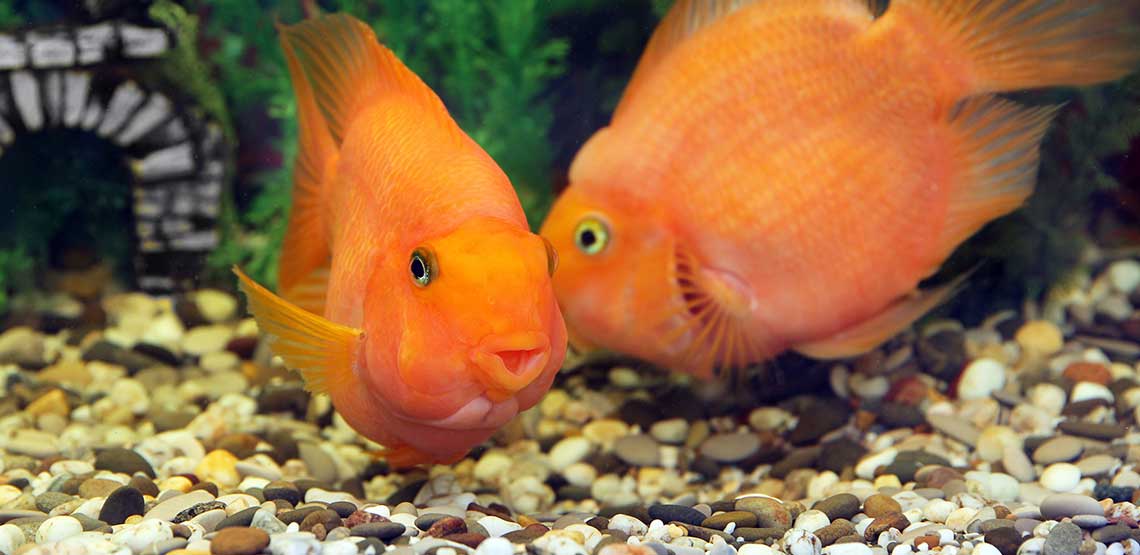Facts About Fish Healthcare
The owner of a home aquarium assumes the responsibility for the health of the fish they keep. By closely monitoring and maintaining the environment of your fish, it is possible to prevent many fish health problems before they occur.
Preventing Illness in Pet Fish
Diseases in aquarium fish can be difficult to diagnose and even harder to treat and cure. The best medicine is prevention, and this translates into making sure your fish live in a healthy environment with minimal stress factors.
Suggested practices to encourage good tropical fish health include:
- Regularly changing the water, preferably no more than 10 to 15 percent of the volume at one time
- Regularly vacuuming the gravel
- Properly maintaining the aquarium filter and pump
- Maintaining the temperature and pH of the water at the recommended level
- Maintaining the salinity of the water at the correct level (for saltwater aquariums)
- Feeding the fish a properly balanced diet and not overfeeding
Fish are sensitive creatures and are easily stressed; this makes them much more susceptible to diseases and other health conditions. Some suggestions for minimizing stress in your fish are:
- Keep the tank's population density low to minimize aggression and improve overall water quality
- Provide plants and rocks for hiding places so your fish don't feel exposed
- Avoid rough handling and minimize transportation, as these weaken the immune system in your fish
- Separate aggressive fish, as excessive bullying can be stressful and can cause physical harm
Common Fish Health Problems
Fin rot is often found in aquarium fish; it results in frayed-looking fins and is usually caused by fungus or bacteria. Ich is quite common, as well. Also known as white spot, it is caused by a parasite. Both conditions require medication to treat, and a fish with ich should also be isolated to prevent infecting other fish. Consult your local pet store or a fish expert for more recommendations on treating diseases, as well as for tips about beneficial fish health practices, including those to promote betta fish health and goldfish health.
You May Also Like:
Related Search Topics (Ads):
Preventing Disease in Fish
Signs of stress often appear before actual tropical fish disease takes hold, so if you can reduce stress, or recognize stress indicators and make appropriate adjustments, you may be able to avoid both freshwater fish disease and saltwater fish disease.
Signs of stress include:
- Fins clamped close against the body
- Shimmy (the fish looks like it is swimming, but it stays in place)
- Red or white sores, often caused by fights or scraping rocks
- Gasping at the water's surface
- Resting at the bottom of the tank
- Glancing, or rubbing itself on rocks or gravel
- Loss of appetite
Fish that show any of these signs are at risk of succumbing to disease, so immediate steps to take are to clean the aquarium, change out some of the water (but not more than 20 percent per day), add Quick Cure, which is available at pet stores and online, add a bit of aquarium salt (salt can even help freshwater fish) and increase the water temperature by a few degrees. These steps will boost the immune system of the fish and give it a better chance to fight off disease.
Treating a Sick Fish
The treatment for aquarium fish disease depends on the type of illness. Some of the more common fish ailments, their symptoms, and their recommended treatments are:
- White spot (also called "ich") appears as tiny white spots on the fins or body. Treat this parasite when it is in the free-swimming stage by adding medication to the water.
- Velvet causes yellow or rust-colored dust on the gills and fins. This parasite is also vulnerable during its free-swimming stage; raise the water temperature, dim the lights for a few days and add copper sulfate to the water.
- Cotton wool fungus causes the scales to appear as though covered with cottony gray-white patches. Treatment includes malachite green and adding salt to the water.
- Dropsy appears as a swollen abdomen and/or loose scales. Dropsy is a symptom of kidney dysfunction, which can be caused by a number of factors. Treatment includes increasing water temperature, increasing water oxygen levels, and adding Epsom salts to the water.
- Fin rot, which can also affect the tail, presents as the disintegration and torn appearance of the fin or tail. Fin rot is usually caused by a wound, and treatment involves adding medication to the water.
While not as cute and cuddly as cats or dogs, fish are pets, too, and as such, they need your time and attention to ensure that they thrive. Make sure you have all of the aquarium supplies necessary to create and maintain the proper environment, follow the recommendations for feeding and tank care, and be sure to consult a professional if you have any questions or concerns about your fish's health.

